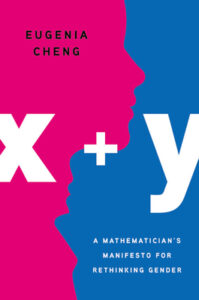 X+Y: A Mathematician’s Manifesto for Rethinking Gender, Eugenia Cheng
X+Y: A Mathematician’s Manifesto for Rethinking Gender, Eugenia Cheng
X+Y is a pretty accessible book, despite being written by a mathematician and professing to be a mathematical approach to the problem. It doesn’t involve much mathematics in the sense of numbers: instead, it uses “category theory”, Cheng’s particular specialism, to try to look anew at the problem of gender inequality. She writes well and makes the concepts very clear, sometimes with the judicious use of diagrams and examples. Not being a numbers person, I expected to be thrown by all of it, but actually I found it quite an enjoyable read.
In the end, what it does is take gender out of the question, and view the problem of inequality as being to do with traits that are associated fairly strongly with feminity and masculinity, but which don’t need to be. In the end, she calls the two extremes “ingressive” (competitive, self-focused) and “congressive” (cooperative), and her suggestions revolve around both individuals and society becoming more congressive.
It’s not that I disagree, because the situations she describes sound wonderful — I’d kind of like to see if she could teach me mathematics, or rather if an approach like this could teach me and get through my aversion. And she mentions disliking the feeling that she had become “ingressive” in order to succeed, and changing that, and I agreed with some of those points too. I think it could indeed be transformative to promote congressive behaviours in your everyday dealings and in the things you have responsibility over.
I’m not sure if it’s an answer to gender inequality per se; I think it is a bit overly optimistic in stripping away factors to claim that congressive behaviour is all we need. At best, what she suggests will be a slow climb.
So an interesting read, and I agree with her in principle — and I’m certainly happy to make the experiment in my own life. I think for many mired in the consequences of binary and gendered thinking, though, it’s a hard sell that it’s all about these simplified behaviours and that we can just promote better ones.





